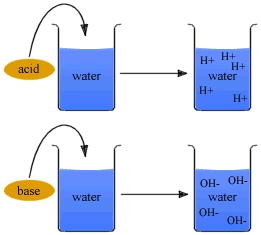Arrhenius Concept
Earlier the norms for the classification of acids and bases were the experimentally observed characteristics of aqueous solutions. An acid was known as a substance whose water solution tastes sour, turns blue litmus red, neutralizes bases. A base was known to be a substance if its aqueous solution has a bitter taste, neutralizes acids, turns red litmus blue, and so on.
Arrhenius Concept
As per the Arrhenius concept, all substances that yield H+ ions when dissolved in water are called acids, while those that ionize in water to provide OH- ions are termed as bases.
HA  H+ + A- (Acid)
H+ + A- (Acid)
BOH  B+ + OH- (Base)
B+ + OH- (Base)

Hence, HCl is acid as it donates H+ ions in water. NaOH is a base as it gives OH- ions in the water.
HCl  H+ + Cl-
H+ + Cl-
NaOH  Na+ + OH-
Na+ + OH-
Acids and bases that ionize entirely in the solutions are called string acids and bases. Some acids and bases are dissociated to a limited degree in solutions, and they are termed weak acids and bases resp. Examples of strong acids are HCl, HNO3, H2SO4, HCIO4, etc. and examples of strong bases are NaOH, KOH, (CH3)4NOH are strong bases.
Free H+ ions are highly reactive, so they are not able to exist in water. The H+ion combines with other water molecules to form hydronium ion (H3O+) molecules, i.e., it has a strong tendency to get hydrated.
The chemical reaction between a base and an acid is termed as neutralization. As per, Arrhenius concept, the neutralization in aqueous solution involves the reaction between H+ and OH- ions or hydronium and OH-. It can be expressed as:-
H3O+ + OH-  2H2O
2H2O
Limitations of Arrhenius Concept
The presence of water is categorically necessary for the acidic or basic properties. HCl in the dry state shall not act as an acid. HCl is considered as an acid only when dissolved in water and not in any other solvent.
TheArrhenius Concept concept does not elucidate the acidic and basic character of substances in non-aqueous solvents.
The neutralization process is restricted to those reactions that can occur in aqueous solutions only, although reactions involving salt formation do happen in the absence of solvent.
The concept does not explain the acidic character of specific salts such as AlCl3 in the aqueous solution.

Similar Questions
Knowledge Check
Arrhenius equation is
AThe Arrhenius constant has units of rate of reactionBThe Arrhenius constant has the units of rate constant of reactionCIf Ea is high, rate of reaction is slowDIf Ea is high, rate of reaction is highArrhenius equation is
AThe Arrhenius constant has units of rate of reactionBThe Arrhenius constant has the units of rate constant of reactionCIf Ea is high, rate of reaction is slowDIf Ea is high, rate of reaction is highArrhenius equation is
AThe Arrhenius constant has units of rate of reactionBThe Arrhenius constant has the units of rate constant of reactionCIf Ea is high, rate of reaction is slowDIf Ea is high, rate of reaction is high
